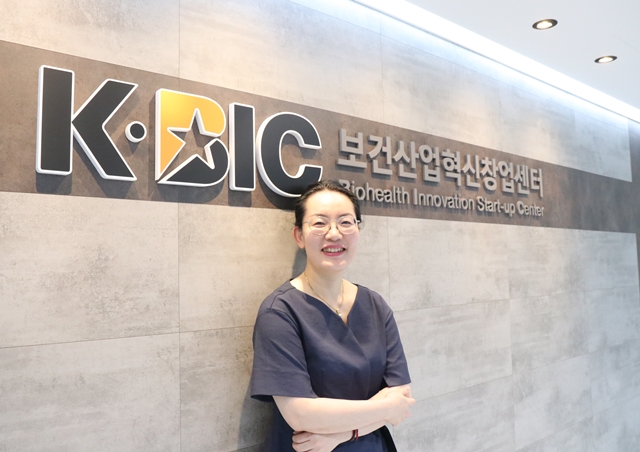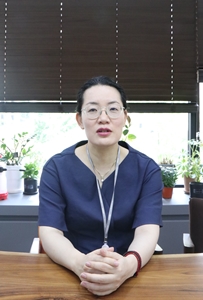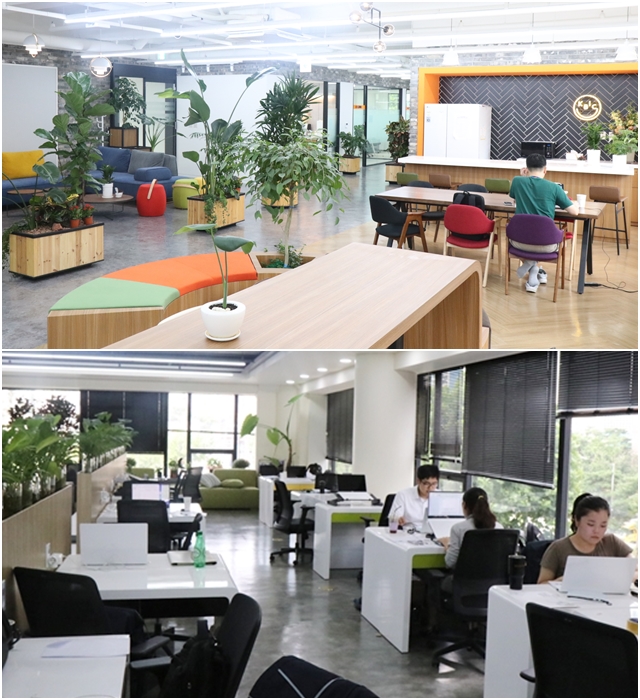[Interview] Boyoung Um, Head of the Health Industry Promotion Bureau of the Korea Health Industry Development Institute
Among various industry sectors, the biotech industry is well-known for its fierce competition and breakneck pace. This is because the industry is indeed high-tech intensive and because being first to place a new product on the market can translate into a lucrative market monopoly. In the swiftly changing biotech industry, strategic incubation and support as well as R&D activities in research institutes, companies and universities are a must.
Boyoung Um, the head of the Health Industry Promotion Bureau of the Korea Health Industry Development Institute (KHIDI), which takes charge in nurturing the nation’s biotech industry and creating an ecosystem for the industry has stated that now is the time to break away from the heretofore entrenched competitive structure and move forward to an era of "win-win."
◆ "Biotech itself is not enough anymore! Convergence is not an option but a necessity!"

Ms. Um underscored that "In the developed nations, a culture of cooperation and convergence has been already established in the biotech industry," and "We need to do the same, and move away from cutthroat competition, cooperating with each other in the biotech sector, supporting the work with multidisciplinary convergence."
She went onto say that "In South Korea, there are 18 regional biotech clusters, small and large, each with its own unique characteristics, and among them, Daedeok, with its research complex, is a virtual treasure trove."
Each regional biotech cluster has a different nature and different strengths; for example, Osong’s cluster is state-led, while the cluster in Seong cluster is conglomerate-led. Daedeok has a private-led cluster and research complex, staffed by a particularly strong ratio of highly-qualified research personnel (PhDs).
Ms. Um stated, "Thanks to the area’s research complex, which includes the LG Life Science Lab, Daedeok has accumulated technology-based knowhow that is needed by start-ups" and "if the frontrunners are prepared to share information and create networks with latecomers and potential start-ups, Daedeok will serve as a strong foothold."
In addition, Daedeok’s research complex, Innopolis, is home to various state-funded research institutes such as the Korea Research Institute of Bioscience and Biotechnology and the Korea Research Institute of Chemical Technology, which makes the complex an even more optimal location for multidisciplinary convergence.
Of course, that does not mean Daedeok is perfect. Um emphasized, "Each regional cluster has its own unique characteristics and strategies, as seen in Daedeok; more importantly, we need to create a collaborative system to complement each other," and "Breaking away from the regional competition, the entire nation should join forces in working as a single integrated cluster."
◆"The best support policy and system to open up the gate of the nation’s biotech industry"
"Support policies and systems are as important as technological prowess and networks in the biotech field. Losing a year due to legal delays can hamper the industry for a decade. We will establish the best possible support system while paying close attention to voices from the field in order to foster robust development throughout the industry."

Ms. Um identified KHIDI’s biggest asset as "networks" accumulated at home and abroad. She explained that "Professionals, including patent attorneys and investors specialized in the biotech industry and KHIDI’s overseas branches that provide a major stronghold in the global market in places such as the US, China, UAE, Kazakhstan and South America are the key to the commercialization of our biotech firms."
Having said that, many biotech firms have difficulties in obtaining specialized information such as professional knowledge regarding commercialization, cooperation with clinical doctors, investment funds and distribution channels to reach the market, and worse yet, don’t even know where to turn to get the information. This is even more true for new start-ups.
In this regard, Ms. Um stated "KHIDI’s networks serve to aid this industrial ecosystem, helping biotech firms to enhance the value of their technologies, achieve early entry into the market, and accelerate their growth."
There are also many things that remain to be done. Many people are still unaware that KHIDI offers a wide variety of beneficial information. There are various departments and bureaus responsible for research work at the Ministry of Science and ICT, the Ministry of Health and Welfare, and the Ministry of Trade, Industry and Energy which are involved in different stages of the process, and provide different levels of benefits through their policies and systems; however many have little awareness of or interest in these support programs.
In an attempt to solve this, the Healthcare Open Innovation Committee (H+OIC) was launched in July 2018. It encompasses more than 60 organizations including relevant associations, research-focused hospitals, new medicine development consortiums, centers for medical device research and evaluation support, graduate schools specialized in pharmaceutics and medical devices and investment institutions specialized in health care, creating a close-knit network to bring a robust ecosystem in bio healthcare and innovative growth.
Ms. Um expressed her resolution that "We will create optimal policies and systems while listening to voices from various players in the industry, and make efforts to support the growth and development of the industry, providing a gate to the Korea’s biotech industry."
◆ KBIC suggests a new paradigm in start-up incubation
"Recently, biotech firms are burgeoning at a pace of 700 to 800 each year. In addition to the enormous costs and time required, an entrepreneur must master the complicated processes leading from the kick-off of the company all the way to the obtainment of licenses and permits. If you don’t understand how these things work, your journey may become long and wandering. It is important to have a guide who can show you the best route."
At the Korea Biohealth Innovation & Start-up Center (KBIC), a new movement is taking place. Established by the Ministry of Health and Welfare and KHIDI to create an ecosystem for innovative start-ups, KBIC began operation in March 2018.

Ms. Um pointed out, "KBIC provides information about each bureau and department, tailored to the business type of each potential start-up company regarding commercialization and start-up procedures. With regards to professional consulting, a dedicated project manager assigned to support each company provides continues management services tailored to the needs of the company."
In addition, KBIC offers start-ups opportunities to expand their networking reach, which can lead to joint research agreements and the establishment of partnerships through group visits to associations relevant to each targeted disease. They carefully assist start-ups throughout the whole process from the recommendation of locations suitable to each business type, access to core technology and relevant organizations up to the stage in which they are firmly established.
"We will continue to support not only biotech clusters and companies equipped with solid footholds but also potential start-ups with strong potential, so that they can establish software and platforms that fully demonstrate their strengths, and create a robust ecosystem for the biotech industry, supporting the ongoing development of the industry."
댓글 정렬